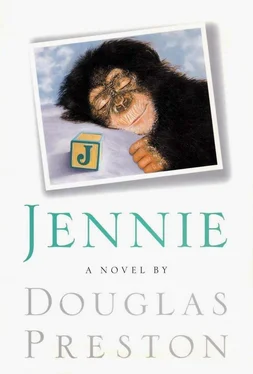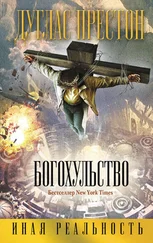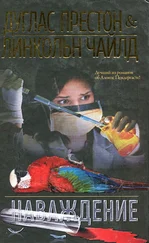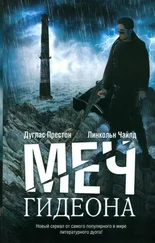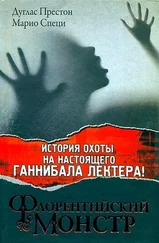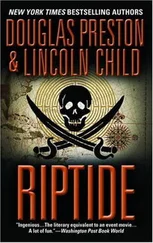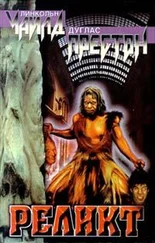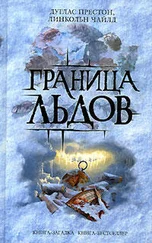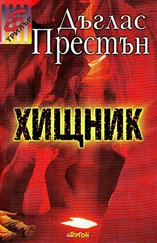We are primates, you and I. Naked apes. His early work was brilliant. His idea, you see, was to look at human evolution from the phylogenetic viewpoint, rather than from the fossil record. He examined the morphology — the shape — of all the closest living relatives to man. Those would be the great apes: gorillas, chimpanzees, bonobos, orangutans, and so forth. He wanted to know: what are the relationships? Where does Homo sapiens fit in? In the end, Hugo put us in the same family as the great apes. He said we didn’t merit a family all by ourselves. I’m not sure I would go that far, but it’s an interesting thought. And an idea influenced, no doubt, by the existence of Jennie. In the end, you see, because of Jennie, he lost his objectivity.
To do the work, Archibald needed skulls. He measured them, and quantified the differences in their shape. From there, using a technique known as phylogenetic or cladistic analysis, he drew a family tree — a drawing of the relationships among the species. Which characteristics were primitive, and which derived? One has to look at many skulls from each species to smooth out the natural variations in shape. Uncle Albert, you see, might have a strange lump on his head that is unnatural. You can only know that by looking at several skulls. Hence, Hugo made many collecting trips after ever more rare animals. His legacy is a collection of physical anthropology that is second to none, a great scientific resource.
Hugo freed the study of human evolution from abject dependence on the fossil record.
I’ve no doubt I’m boring you. Perhaps at my age I’m no longer making any sense at all. I am a very foolish fond old man. By all means, edit what I say, make it sound comprehensible and even intelligent — if such a thing is possible. If your publisher works as fast as mine, I’ll be dead by the time your book appears.
What was Hugo like? Physically, you mean? During the Jennie years he was a lean, bony man. His hair was black and unfashionably long. He had dark eye sockets in which lived two restless black eyes. My, that sounds good. Maybe I should be writing this book. He looked like a British schoolboy, with his hair flopping down over his forehead. He had shifty eyes, not out of guilt, but out of curiosity. His mind was always clicking away while his eyes darted about. His posture was bad; his mother never taught him to stand up straight. That’s one advantage of a Jewish upbringing, you know, having good posture. My mother never would have let me get away with that slouch! Hugo’s breathing was distinctly audible. We’d be examining a specimen and I could hear him wheezing next to me like a set of bagpipes. He was missing the very top part of his left ear. He used to say it was a machete cut, and he had a marvelous story to go with it, but in fact it was a small birth defect. He had inherited many fierce prejudices from his father — what an eccentric man that was! — but he was far too innocent to understand his prejudices, let alone understand himself. His prejudices included a dislike of businessmen, movie actresses, policemen, people who drove Cadillacs, people who voted for Goldwater, and the annual Botolphstown Cotillion. He would become excited, raving about one thing or another. And then in the next moment he’d have forgotten all about it. He licked his plate after eating. He picked his nose when he thought no one was looking. He had a bit of the exhibitionist about him. In a quiet way. He did what he pleased and the hell with ’em. I mean the rest of the world. What was it Voltaire said? “To the living we owe respect, but to the dead only truth.” I honor Hugo’s memory by telling the truth about him.
I have not, in my lifetime, had another friendship I valued as much as his. When I first met Hugo, he was thirty and very eager. And naive. He was going to do great things. He used to bemoan the fact that the Nobel Prize was not given in his field. And he did accomplish great things. By the time he was forty, he had done more than most scientists do in a lifetime. With Jennie and her celebrity, he was forced to grow up in a great hurry, and this was a terrible shock to him. It was a shock that something awful could happen to him. Most of us, as we launch into adult life, feel invulnerable, or at least puissant, but some of us are more ready for tragedy than others. Hugo was not at all ready. Or if he was ready, he was blindsided; he never thought it could come from the direction it did.
It changed him. It changed all of us; she changed all of us. But Hugo, in particular, was never the same. I will tell you what I think. After Jennie, his science was no damn good. You see... Excuse me, I believe I’m telling you the moral of the story before you’ve heard the story. I will only say this. He was like so many scientists: he thought he could separate object from subject. He ignored the human dimension of scientific work, the effect of the observer on the observed. And vice versa ! You see, what we observe is not nature itself, but nature exposed to our questioning. And what we are, of course, is a response to what we observe. This is what tripped Hugo up.
To the story, then. We can moralize later.
Hugo returned from the Cameroons in the early fall of 1965. A few days later he brought Jennie to work with him. She caused a sensation. He got off the fifth-floor elevator and came down that hall, with that little black chimp riding on his neck. Everyone started coming out of their offices. Hugo’s office was at the end of the hall, in the corner. It was smaller than most offices but had a splendid view. He had a hideous old Victorian wing chair, which Jennie promptly claimed as her throne. He plopped her down in that chair and she sat back like a princess receiving courtiers, her legs sticking straight out, her eyes half closed, extending to each visitor a languid hand. She was wearing only a diaper, a T-shirt, and a hat. That hat! It was absurd, and it sat like a crown on her head, nearly obscuring her eyes, propped only by her big ears. I remember shaking her hand while her eyes wandered about the room, looking over my head, at my feet — like a rude guest at a party.
Even at six months she was full of the devil. At one point she snatched a pair of glasses from some hapless secretary — one of those marvelous cat’s-eye glasses decorated with rhinestones — and they had to be pried out of her hands while she screamed piteously. It was as if she were being deprived of her last possession in the world. The glasses arrived back to their owner in a sad condition. Poor Hugo was always paying for something that Jennie had broken.
Jennie was a terribly captivating animal. There is something fascinating in looking at a chimpanzee, seeing an echo of humanity in the thing. I stayed on after everyone had left. Hugo gave Jennie a National Geographic magazine while we lit our pipes; I my Dunhill with Balkan Sobranie; Hugo that drugstore pipe filled with rum-soaked Borkum Riff Ready-Rubbed. Ugh.
Jennie was so small, she had to drag the magazine by both hands across the floor. She hauled it to my chair and hauled it up, where she settled in my lap, turning the pages. She then made a grab for my pipe.
I raised it out of reach. I told her that she was too young to smoke.
She did not like to be crossed. She gave my tie a yank, and then pulled off one of my buttons. Hugo scolded her, but she paid no attention.
The chimpanzee went back to her National Geographic , and coming to an especially interesting and colorful page proceeded to tear it out. Hugo took away the magazine and there was a brief struggle for the page, while Jennie screamed again.
Hugo told me his wife, Lea, was adapting well. Now that is one fine woman, Lea. Very capable. Did you talk to her as I suggested? Quite an imposing figure, isn’t she? She comes from an old Boston family. The Dickinsons. Emily was her great-aunt. And the first sexologist, before Masters and Johnson, was also a Dickinson. Very distinguished family. Of course, she is like all of those blue bloods, very diffident. You’ll never get her to admit it. And, of course, the Dickinsons lost their money when the Boston and Albany defaulted on their bonds in ’32.
Читать дальше
